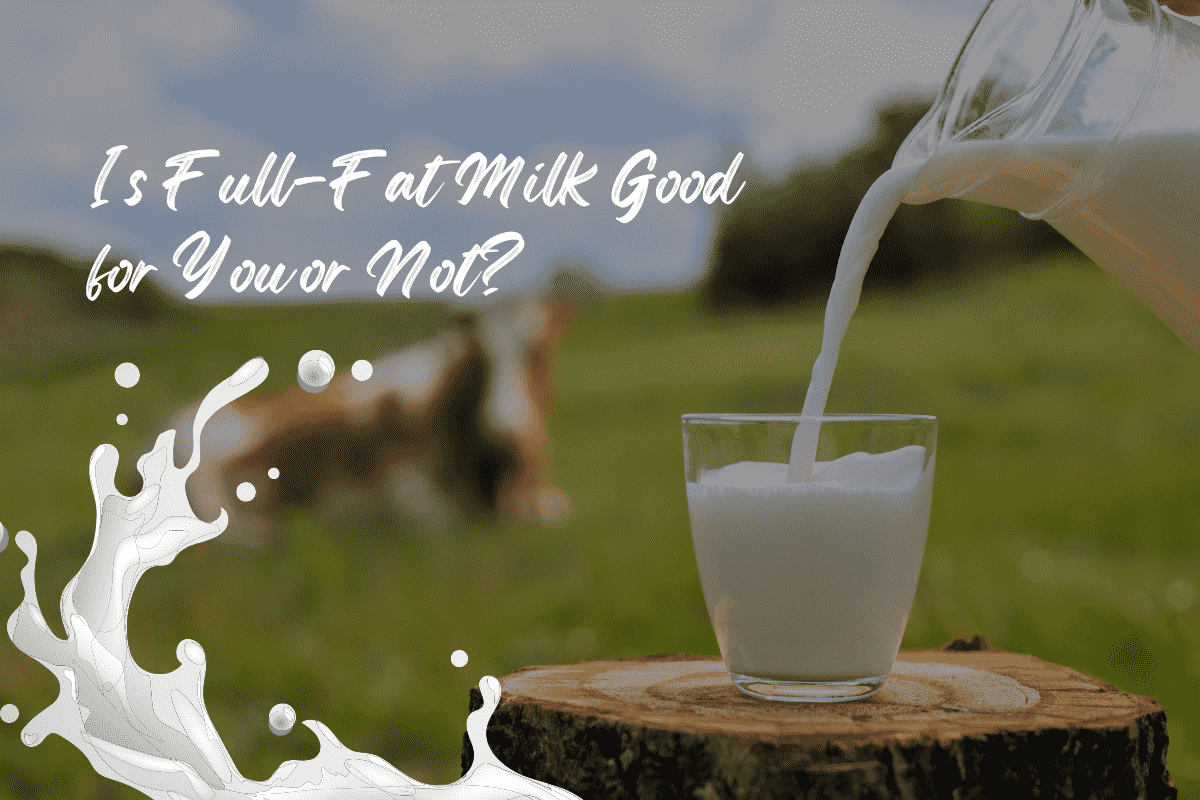Registered dietitians reveal how it compares Full-fat milk and Low-fat milk.
Let’s Settle This: Is Full-Fat Milk Good for You or Not?
Milk is healthiest drink in the world and so many health benefits of drinking milk daily. But, do you know full-fat milk is good for you or not ?
If you offer a person who usually drinks whole milk a glass of skim milk, they will probably say it tastes like water. On the other hand, if you give someone who is accustomed to drinking 1% milk a glass of whole milk, they might be surprised by how thick it is.
Skim milk has been the go-to healthy milk option for many years. However, recent research has raised questions about this widely accepted notion. Could it be that full-fat milk is regaining its popularity? Let’s find out what scientific aspects of whole milk and uncover its potential health advantages.
Is Full Fat Milk Healthy?
Registered dietitian nutritionbykylie, Kylie, MS, RD, LDN | Dietitian, suggests that full fat milk is a healthy choice for individuals who can tolerate dairy. It’s worth mentioning that full-fat milk does contain sugar, approximately 14 grams per cup.
However, Kylie explains that the fat in whole milk helps regulate blood sugar levels, preventing spikes. Additionally, the fat in whole milk provides a greater feeling of satiety compared to lower-fat milk options.
Full-fat milk is also packed with nutrients. Kylie points out that it has calcium, omega-3 fats, and potassium.
Full Fat vs. Low-Fat Milk: The Creamy Showdown
The main difference between full-fat and low-fat milk? Fat content! Full-fat milk boasts around 8 grams of fat per cup, while low-fat dips down to 1-2 grams. This impacts calories too – full-fat packs 150 calories, while low-fat offers around 100.
But it’s not just about calories. Full-fat milk is a richer source of vitamins A, D, E, and K2, all crucial for bone health and other functions. Additionally, some research suggests full-fat milk might keep you feeling fuller for longer and may even be linked to a lower risk of type 2 diabetes.
However, low-fat milk remains a heart-healthy option for those watching their fat intake. It still provides essential nutrients like protein and calcium.
Ultimately, the best choice depends on your individual needs. If you’re healthy and active, full-fat might be a good fit. If you’re managing weight or have cholesterol concerns, low-fat could be your champion. Remember, moderation is key for both!
Debunking the Saturated Fat Myth:
In the past, full-fat milk was criticized for its saturated fat content. But recent studies show a more complex situation. Although saturated fat can increase LDL (“bad”) cholesterol, it might not be the only factor contributing to heart disease.
Research suggests full-fat milk might contain other components that counteract the negative effects of saturated fat. These components could even improve HDL (“good”) cholesterol levels
Potential Benefits of Full-Fat Milk:
Weight Management: Studies suggest full-fat milk might promote satiety, potentially aiding weight control.
Reduced Disease Risk: Research indicates whole milk consumption may be linked to a lower risk of type 2 diabetes and metabolic syndrome.
Nutrient Powerhouse: Full-fat milk is a rich source of essential vitamins (A, D, E, K2) and healthy fats that support bone health and other bodily functions.
Who Should Consider Full-Fat Milk?
Healthy Individuals: If you have a healthy heart and cholesterol levels, full-fat milk can be a nutritious addition to your diet.
Active People: The extra calories and fat in whole milk can provide sustained energy for athletes and those with active lifestyles.
Important Considerations:
Moderation is Key: Regardless of fat content, enjoy milk in moderation as part of a balanced diet.
Individual Needs: If you have pre-existing health conditions like high cholesterol, consult a doctor before switching to full fat milk.
Final thought
The answer to whether full-fat milk is good for you isn’t a simple yes or no. It depends on your individual health and dietary needs. While skim milk remains a healthy choice, full fat milk offers a range of potential health benefits that shouldn’t be ignored.
Looking for more information? Consult a registered dietitian or healthcare professional for personalized guidance on choosing the right milk for you.
FAQs related to Full-Fat Milk
How healthy is full-fat milk?
The health benefits of full-fat milk are being re-evaluated. While it contains more saturated fat than low-fat options, recent research suggests saturated fat may not be the sole villain in heart disease. Full-fat milk also packs essential vitamins and potentially helps with weight management and reduces disease risk for some.
What is the healthiest milk to drink?
There’s no one-size-fits-all answer. Here’s a breakdown:
Full fat milk: Good for healthy individuals, active people, and those seeking additional nutrients.
Low fat milk: A heart-healthy choice for those watching fat intake and still provides essential nutrients.
Is fat-free milk better for you than whole milk?
Not necessarily. Fat free milk is lower in calories and fat, but also loses some vitamins A and D. If you choose fat-free, look for fortified options to regain those nutrients.
When should I drink full-fat milk?
Milk can be enjoyed as part of a balanced diet:
Post-workout: Provides sustained energy for active individuals.
Snack time: Promotes satiety and helps manage hunger.
In your coffee: Adds a creamy richness without compromising on taste.
Sources:
nutritionbykylie, Kylie, MS, RD, LDN registered dietitian
Visual Story
Also Read : Early Warning Signs? Your Smartwatch Could Help Detect Alzheimer’s

